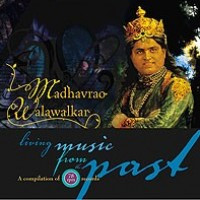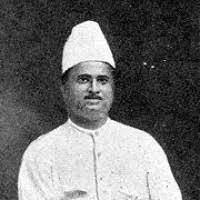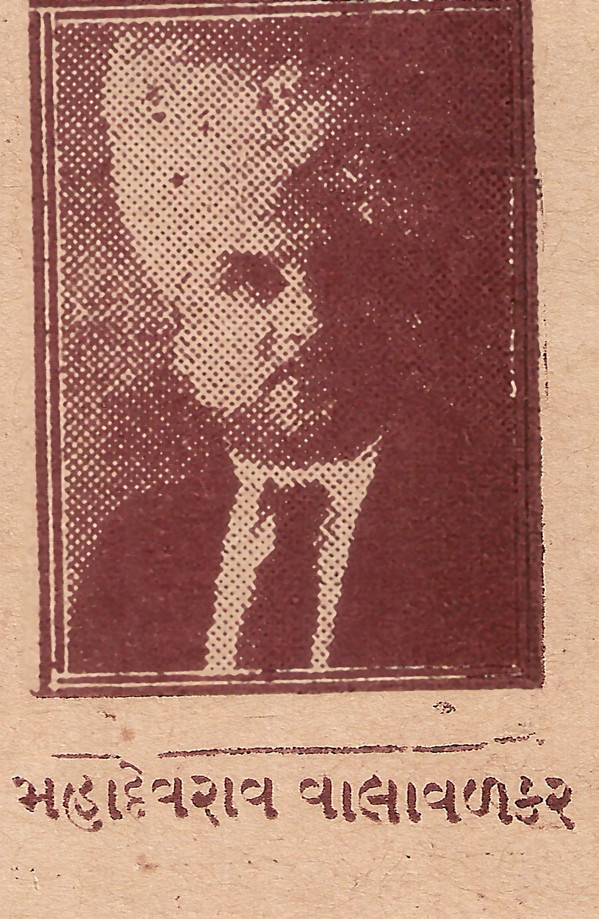Madhavrao Valavalkar
Настоящее имя: Madhavrao Valavalkar
Об исполнителе:
Born in Sangli, Mr. Madhavrao Valavalkar lost his parents at an early age and was brought up at his maternal uncle’s residence in Zarap village. He completed his primary education there with Marathi as the medium of instruction. He then moved to Mumbai at the age of fourteen and was employed as a clerk between the years 1904 and 1914. Initially drawing a salary of Rs.8/- per month, he kept long hours in this job. His work involved maintaining accounts for his employer in the Modi script. During this period, he stayed at the Lohar Chawl or what was also known as the Princess Street area. Madhavrao was interested in theatre since his early days in Mumbai. He first saw Bal Gandharva playing the role of Subhadra in a theatrical production in 1908 at the Bombay Theatre. He was by then drawing a salary of Rs.15/- to Rs.20/- per month and financial constraints made it difficult for him to purchase a ticket for this performance. Despite this, he attended the performance and heard two songs from the second act of the play while standing in the corridor of the hall. His interest in music led him to join Anant Manohar Joshi’s Guru Sangeet Vidyalaya in 1913. Within the first three days of his joining this class, Joshi wondered why Madhavrao was working as a clerk when he had a good voice and an impressive physique - qualities that would enable him to join the theatre. Joshi suggested that he enter the world of theatre, as this would give him money and fame, and invited Keshavrao Bhosale, Virkar and others of the Lalit Kaladarsh Natak Mandali to audition Madhavrao. Bhosale stipulated that he would play the role of Narada in the play Soubhadra and the terms of employment would be decided based on this experience. Accordingly, he trained between 8 and 10 every morning and continued to work as a clerk after 11 a.m. This arrangement continued for a week but he was skeptical about the manner in which people would react to his decision to join the theatre. Those were the days when people involved in theatre were generally not treated with respect by the rest of society. Consequently, he stopped attending his music class and severed his nascent links with theatre. In 1914, Keshavrao Bhosale tried yet again to involve Madhavrao in theatre. Madhavrao finally decided to accept his invitation to join the Lalit Kaladarsh Natak Mandali and moved to Amravati for a month after taking a month’s leave from his employer. Bhosale decided to pay him a salary of Rs.40/- per month. His earlier job as accounts clerk came in handy even in his new position and he was also paid an extra Rs.10/- for maintaining accounts for the theatre company. Lodging and boarding was taken care of by the company. Initially, Madhavrao was asked to play the role of sutradhar (narrator) in various plays. He was Vasishta in Ramrajya, Narada in Soubhadra and Sharvilak in Mricchakatika. A year went by in this manner during which time, he received training in vocal music, posture and movement on stage, and in other aspects of theatrical performance. The preliminary training was conducted by Keshavrao Bhosale. While in Lalit Kaladarsh, Madhavrao gained public recognition for his roles in the plays Hach mulacha baap and Sanyasacha sansar. However, he left Lalit Kaladarsh in 1920 at Solapur due to a disagreement, and reached Mumbai to join the Gandharva Natak Mandali. His salary at the Lalit Kaladarsh was Rs.110/- at the time he left. Madhavrao joined the Gandharva Natak Mandali in 1921 and was associated with this company for a period of thirty years. The popularity of the Gandharva Natak Mandali was largely due to the enterprise and performances of its proprietor and eminent actor-singer Narayanrao Rajhauns alias Bal Gandharva. Madhavrao’s first role in the Gandharva Natak Mandali was that of Shukracharya in the play Vidyaharan. It was however his role as Krishna that brought him much public acclaim.He acted as Chokhoba in around 1931, which increased the devotional sentiment in him. In time to come, he developed a liking for harikirtan and began performing kirtans after retiring from theatre. In the long years of his association with the Gandharva Natak Mandali, Madhavrao had several interesting experiences both on and off stage. In 1925-26, Narayanrao and Shankarrao Vyas, disciples of Vishnu Digambar Paluskar organised a music conference in Ahmedabad. Scheduled among the performances were stage songs rendered by Vinayakrao Patwardhan. Patwardhan could not attend this festival due to unavoidable circumstances and sent Madhavrao in his stead. Madhavrao was in Baroda at the time with the Gandharva Natak Mandali for the birthday celebrations of Sayajirao Gaikwad, head of the princely state of Baroda and patron of the company. During this visit to Ahmedabad, Madhavrao experienced the way of life at the Sabarmati Ashram, where Narayan Khare, another disciple of Paluskar resided with his family. Khare had set to tune Hindi, Marathi and Gujarati bhajans in various raags.Madhavrao had the opportunity to be a part of the interaction that took place in the Gandharva Natak Mandali between actors-singers and other musicians. Among some of the reputed musicians in the Mandali were, Vinayakrao Patwardhan, disciple of Vishnu Digambar Paluskar, engaged as actor-singer in the company, and Ahmed Jan Thirakwa and Qadir Baksh, who were retained as tabla and sarangi players, respectively. His own account of his life and times shows him to be a man of great strength and resilience. He recounts a special concert of Faiyaz Khan that was organized in 1937 at Baroda for the Gandharva Natak Mandali. Faiyaz Khan asked for one of the Mandali actor-singers to sing before him. No one was willing to face this situation, but when Madhavrao was requested, he immediately agreed to do so. On another occasion, he agreed to step into a role normally played by another actor, since the latter was unwell. He knew the dialogues and songs meant for the other actor very well and he received tremendous public applause for his performance. He was extremely hard-working and did not let even the occasional health problem disturb his performance. On one such occasion, despite high fever, he continued with his part in the play.As an actor-singer, Madhavrao was known for his beautiful voice, clear speech delivery and a good physique. Madhavrao’s well-wishers and fans celebrated his 70th birthday at the Laxmi Baug Hall, Mumbai. Present at the function were historian N.R. Phatak, Bal Gandharva, renowned harmonium player Vitthalrao Korgaonkar, music director Vasant Desai and reputed lawyer Sushil Kavlekar, among other distinguished persons. References: G. F. Aajgaonkar (ed.), Abhinayapatu Natavarya Madhavrao Walawalkar, (Marathi), Prabhodhan Research Association, Mumbai, 1983. (This source contains an autobiographical note by Madhavrao Walawalkar.) Biographical note prepared by Aneesh Pradhan
Альтернативные названия:
Вариации названий:
Madhavrao Valavalkar
Singles & EPs Shellac 1925 India
10", 78 RPM
Madhavrao Valavalkar
Singles & EPs Shellac 1925 India
10", 78 RPM
Madhavrao Valavalkar
Singles & EPs Shellac 1940 India
10", 78 RPM



